#it's clearly contextual in some way
Text
disturbing
I was writing a post and at the end I was adding tags, as I do, and I typed the singular first person pronoun, I, and a list of tags popped up as suggestions that took me the fuck out. It was so disturbing I took a screenshot.
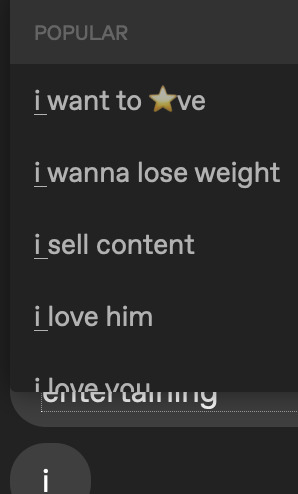
[image ID: a list of suggested tags, screenshotted. It's titled "popular" and the list is "I want to [star emoji]ve" "i wanna lose weight" "i sell content" "i love him"]
I wanna star-emoji-ve???? Well there's some pro-ana shit for you.
I don't know if the kids these days remember this but back in Livejournal around the era of strikethrough (the '07-'09 time period is where I remember noticing it) there was a movement to censor pro-self-harm blogs, that were support groups mostly supporting one another in more and more extreme anorexic/self-destructive/eating-disordered behaviors.
This is absolutely that. And they were like "it's self-expression" and everyone else in the world was like "it is actually a toxic encouragement of self-harm" because they were like, concretely instructing one another and recruiting vulnerable people to join them in ways to literally starve to death, they were support groups for killing yourself more or less, and so those tags would occasionally get banned or delisted or removed from search or whatever, but remember this was very early in the history of such things, and there was no algorithm. But people did use the browsing of blogs' "interests" to find one another, it was a feature of how Livejournal worked, and there wasn't a lot of moderation but the deactivation or delisting of those self-harm-encouraging tags were a hotly-contested bit of debate.
And so they got more creative, and found other ways to find one another, and people starved to death or otherwise irreparably damaged their bodies and their mental health and so on. I cannot emphasize enough, this was not fiction. These were not fictional stories depicting fictional scenarios that weren't happening, these were real people posting stories and encouragement and photographs of their real selves, showing off how much damage to themselves they were doing, concretely encouraging one another to do the same. This was not fiction.
But they kept finding new ways to talk about it so it couldn't be censored.
And then LJ deleted blogs for posting about fiction instead, and we all kind of forgot about it and moved on.
Highly displeased to find that it's all alive and well on Tumblr, to the point that it's the number one suggestion when I type the fucking first-person pronoun into the tag field, and I can't opt out of seeing that. COOL.
#someone told me to report this to tumblr#but i don't know how#so i'm posting about it instead#it's not like a blog i can link to#it's their fucking automated suggestions i can't opt out of#if i type it now it doesn't come up#because i have no idea what criteria they use for this#it's clearly contextual in some way#what are they analyzing idk#what about my blog led their shitty algo to decide i'm into that#idk but it's upsetting as fuck#and here we are worrying about fictional depictions of shit omg
48 notes
·
View notes
Text
mary doesn’t know what a gay person is enough to be homophobic towards gary
#ib spoilers#(written after All Of This: Apologies for the brain vomit.)#this eventually turns into a screed against liking sibling ships LMFAO#ok now the tags begin:#thats the only thing stopping her#(semi-joking. like lol heehee mary hostility moments but. honestly i'm not sure she even dislikes him particularly????????)#(like. replaying the game. she's more frustrated than anything at him + obviously thinks the 'bunnies' are cute)#(she doesn't HATE the guy and has some sorta warped affection for 'im in that 'rips up your heart flower in a loves-me-not game' way but.)#(still clearly sees him as an Obstacle more than anything. a means to an end.)#(jealous of ib's trust in him in their dysfunctional three-person found family dynamic BECAUSE SHE CAN ONLY CONTEXTUALIZE#HER BABY-BRAIN AFFECTION FOR IB AS A SISTERLY THING BC WRAPPING THIS AROUND SHE DOES NOT FUCKING KNOW WHAT A GAY PERSON IS#also for the record i said this before but i Do Not Ship Them!!! and frankly mary would move on by the time she realizes what being gay actu#actually is. she's like 9 and ib was the first girl she met in her age group. we aren't having any funny buisiness here thats gross.#i. hate explaining that every fucking time i bring this up but i cannot stress enough how unwelcome *those* sorts of shipping-brains are.#it sucks. i just want to discuss the definitely-embarrassing-to-her-#.-later-in-life motives of the human sacrificing painting girl and insinuate she's gay without the precident of FREAKS getting wierd aboutit#ANYWAYS CITRUS FUCKING *SUUUUUUUUUUUUUCKS* AND IF YOU SUPPORT FICTIONALIZED GLORIFICATIONS OF STEP-SIBLING SHIT DIE fJHKSDHGLKJSDG#*cough* anyways but yeah mary doesn't know what a gay person is
6 notes
·
View notes
Text
I was never really certain about my transition in the way that most gatekeeping hormone prescribers and curious members of the public demand that a trans person be. I didn’t “always know” that I was not cisgender. I haven’t “always known” anything about myself. Very few truths about me have always remained true, my existence is too interpersonal, contextual, and ever-evolving for all of that. (So is most everyone else’s, I think). I don’t think that the fact I’d eventually choose to exercise my body autonomy at age 30 by taking hormones is a decision I could have foreseen when I was a child.
All that I knew about being transgender when I was a kid was a fact that most children intuitively know: gender assignment was a violation of my freedom, of everyone’s freedom in fact, and it was wrong. As an infant and then a child and teenager, people kept imposing labels on me; they kept forcing me and my body into prescribed gendered boxes, and while the specific labels and boxes never really felt like the right ones, the most disturbing part about it all was the forcing. No coerced identity would have ever felt right.
Children can tell when secrets are being kept from them, and when adults are restricting their choices. They notice that they and the other children are being lined up boy-girl, boy-girl, without ever being told what a girl or a boy even is. They can see their parents frowning when they reach for the doll with the shimmery hair, or climb atop the neighbor kid on the playground. Kids know that they are forbidden from sitting with their legs spread wide or flicking their wrist, and their gender illegibility is shamed in them, long before they get any answers about what gender means or where it comes from or why it’s so important that they make themselves easy to understand.
Like the cloned children in Never Let Me Go who grow up being conditioned for a life of forced organ donation, children in a cissexist society grow up conditioned to fall within certain gendered boundary lines, and by the time they learn that the reason for this is almost completely arbitrary, they can’t imagine any alternative. Not until some of them hear about gender transition and find the prospect very compelling, for some reason.
You can say that reason is because some of us are inherently trans, but there’s absolutely nothing in the way of brain science, genetics research, or even sociological data to back that up. Besides, the search for a biological “reason” that people are transgender or queer runs counter to the goal of queer liberation in the long run. Science only needs to explain the existence of transgender people (or queer people more broadly) if our existence is in some way aberrant or a problem.
If queerness is accepted as a form of human diversity that simply exists, then there is no need to excuse it by claiming that it is never a choice. It can be a choice, if a person wants to make it, and hopefully it satisfies them, but maybe it won’t. Freedom to choose means freedom to forever be dissatisfied, to search endlessly for more, and yes, to capable of making a mistake.
I would say that viewing myself as transgender was a choice. I decided to break away from the straight, female categories to which I had been assigned, and doing so allowed me to view the legal and societal power structures that had restricted me more clearly. It helped me better understand myself. But that does not mean the actual act of breaking away was always the truest reflection of who I am.
The version of me that transitioned was a person on the run — and how a person behaves, thinks, and self-conceives when they are fleeing is not a great reflection of whom they might be if they were safe. If we all lived in a world free from mandatory gender assignment, and where our bodies were not mined for meaning about the kinds of sex we liked, the clothing we should wear, the personality qualities we have, the roles we should play in society, and the connections we are allowed to form with others, who knows who each of us might be.
But none of us get to live in that world, or ever gets completely free from the frameworks of heterosexuality and the gender binary. These frameworks shape every legal institution we encounter, every school we attend, every item of clothing we put on, every substance we take into our bodies, every piece of paperwork that ever gets printed about us, and every look another person ever gives us. And so we make due with rewriting and recombining those frameworks as best we can.
It should come as no surprise that those us who break away from the binary have to experiment and revise how we understand ourselves quite a bit — sometimes getting things “wrong,” sometimes searching forever for the semblance of something “right.” Sometimes reveling in the “wrongness” of all the available options is kind of the point.
I wrote about my detransition, retransition, and the eternal dissatisfaction that is probably the corest truth of my identity. It's free to read or have narrated to you on my Substack.
298 notes
·
View notes
Text
you know what makes enid such a lovable character? she’s deceptively complex, and the specifics make her so fucking precious. LET ME PROVE MY THESIS.
when enid is first introduced in the show, we might be inclined to think that she’s merely a shallow representation of the polar opposite of wednesday—colorful, peppy, social, loud. but she’s so much more than just wednesday’s antithesis. and you see that from their very first interaction.
enid, clearly excited and optimistic about meeting her new roommate, rushes up to greet her with a huge smile and outstretched arms (already, a sign of her kindness). but the very second she realizes wednesday doesn’t want to reciprocate, she holds off. this might not seem like a big thing, but it’s extremely telling. for one, it shows us that before everything, enid respects wednesday’s boundaries. wednesday, who she doesn’t even know yet. and she continues to honor wednesday’s disinclination to hugs, repeatedly, until the final scene. it also indicates that she’s not ditsy or cluelessly abrasive like some other characters who share her disposition. enid is genuinely, thoroughly kind, and it’s striking.
however, as the scene continues and enid gives wednesday a tour of nevermore, it becomes clear that even though she is kind, she isn’t a one-dimensional people-pleaser. she doesn’t hesitate to give wednesday’s attitude right back to her. like when wednesday expresses annoyance over the name of the quad and enid tells her that “the whole snarky, goth-girl thing might’ve worked at normie school, but here, things are different,” and when wednesday shows disinterest in “participating in tribal adolescent cliches,” enid tells her to “use it to fill your obviously bottomless pit of disdain.” is enid sweet? yes. and is she (not so) subtly trying to impress her cute brunette roomie with her knowledge and interests? also yes. but what she’s not about to do is let wednesday sass her without matching her energy. it’s almost a playful kind of banter (i would say borderline flirtatious), and it’s one of the reasons wednesday is instantly drawn to her; enid isn’t afraid of her, or uncomfortable around her, or put off by her unfriendliness; instead, she’s able to interact with her in a way that keeps wednesday on her toes. this, combined with the way enid continuously respects her boundaries, is a dichotomy that wednesday finds irresistible, and it’s why she can’t not treat enid differently than everyone else. and it’s a big reason why she falls for her.
enid’s complexity only deepens when we discover that she can’t wolf out. we find out that she’s terrified of being alone, and as we get to family weekend, we see the dysfunctional dynamic she has with her parents. it becomes apparent that enid herself is a dichotomy; she presents herself to her peers as confident and bubbly and full of optimism, but the second she’s alone with her family, we see a glimpse of her truest self, who she is behind the mask—weary, sad, almost demure, responding to her mother’s criticism with a tired kind of acquiescence, “that’s me, a huge disappointment.” enid isn’t at all what we might have initially thought her to be, and to see her deal with not measuring up to her family’s standards makes her all the more authentic and relatable.
considering all of this, enid’s duplicity contextualizes her delicacy with wednesday in a way that is uniquely captivating. because enid has every reason to close herself off to other people, especially to her roommate who doesn’t even seem to like her, but she doesn’t. in fact, she goes above and beyond trying to befriend her—promising to keep her secret about nero, seeing her off with tyler at the harvesting festival, inviting her to multiple social events, expressing an interest in “bonding” when she took her dress shopping, organizing a birthday surprise for her, knitting her a snood in her signature colors, and even pulling one over on weems so that they could have a girl’s night out. so when she finds out that wednesday has deceived her, she’s rightfully upset and extremely hurt. during the fight scene, all of this comes out, and for the audience—much like for wednesday—enid’s anger is pain-inducing. we see the strength of her vulnerability in that moment, we see her reach the end of her rope, as it were, because deep down enid is just plain exhausted. and that’s what makes her really real. i see the humanity in her so clearly, and it makes me want to cry. it makes me want to reach through the screen and comfort her like wednesday couldn’t in that moment.
but as we know, enid comes back for wednesday. why? because even after everything, even after the betrayal and the snide remarks and the silence, she still wants to take care of wednesday. she still wants to be there for her, to protect her and be her friend. without waiting for an apology from the person who wronged her, she came back. and if that doesn’t make you love enid sinclair with all of your heart, nothing will.
213 notes
·
View notes
Text
I just realized that in s5, instead of a parallel to Mike breaking down with Hopper and just doing that again, I want one with Mike and Jonathan.
Something interesting about Jonathan is that he tends to be pretty quiet in situations where literally everyone is being critical of Mike, notably in the scene at Hopper’s canon when he blurts out that he loves El. That whole scene everyone is ganging up on him, most notably Nancy, but the whole time Jonathan is just staring at Mike, deep in thought…
We also know he witnessed A LOT in s4 in regards to Will and just the whole truth of the situation might be closer to him then we realize. Like for example, even though we didn’t see Mike’s expression in the van scene after the painting reveal, with it being blurred from our view, Jonathan on the other hand did see it. He also was there for that and the monologue at SB where he basically just used Will’s words to try to save El. And so what does Jonathan think about that?…
While I know the expectation for a lot of fans is that Jonathan like hates Mike bc of him hurting Will as of the last year or so on a couple notable occasions (now El too presumably), I think there is still something complex about their relationship that would make for a pretty epic television.
Not saying the scene couldn’t start out with some clashing and stuff, bc I mean after all the literal same thing happens with Hopper and Mike in s2. The scene starts confrontational and emotional only for Mike to start sobbing and literally fall into Hopper’s arms for comfort. Even in the following scene he chooses to stay close to Hopper’s side, like it’s clear his outburst had less to do with Hopper ‘lying’ and more to do with all of his bottled emotions coming to head in that moment. And in the company of a man that he looks up to, who is basically seeing him at his lowest.
And I think Jonathan and him having a moment like this, in their own way, maybe related to El again like the talk with Hopper, but I think it ending with it being about Will and Mike breaking down again, maybe thinking Jonathan hates him and then turning it on himself like no one hates me more than I hate myself for how I feel. Or just him basically getting emotional over a similar situation to s2, but us basically getting the Will side of it this time, which would essentially re-contextualize the s2 scene as well.
Another reason I think this scene would be incredible honestly, is because Finn very clearly looks up to Charlie, with him literally following him around on set and you can just tell they have a very close bond that would make for incredible chemistry on screen as Jonathan just like Hopper (arguably even more so), is in this male position of someone that Mike looks up to, who also knows sides of him that quite frankly no one does, it has the ability to be a really emotional and gratifying moment.
Maybe Jonathan is being a little bit curt with Mike and it leads to an argument of some sort. Though it ends with something along the lines of Mike just breaking down and Jonathan comforting him like I never hated you Mike and him just holding him and them talking about their true feelings about the situation.
Mike’s never gonna get that sort of deep and emotional bond with his father, so it feels almost poetic that he’d have these moments with the two men in Will’s life who’ve also had a huge impact on Mike’s life as well and who he will be tethered to forever as family bc of his relationship with Will.
I need it and I need it yesterday.
561 notes
·
View notes
Text

WELL I WAS PLANNING ON PLAYING CELESTE THIS EVENING BUT INSTEAD I WILL NOW DEVOTE IT ENTIRELY TO INDULGING MY HYPERFIXATION
IT'S FINALLY TIME FOR A PORKY POST
Are Ness and Porky Friends...?
Let's talk about that 😏
First things first, I think this single moment from the beginning of the game is by FAR the most important thing to consider when thinking about how Ness and Porky's relationship is presented to us
Right at the start, when you make your way up to the meteorite, you will encounter the cops and their blockade
This also serves as our first introduction to our wonderful neighbor, Porky Minch, who is currently making a nuisance of himself trying to get up to the meteorite, much to the cops' chagrin
One of the cops asks if we could help deal with Porky, and asks this vital question:
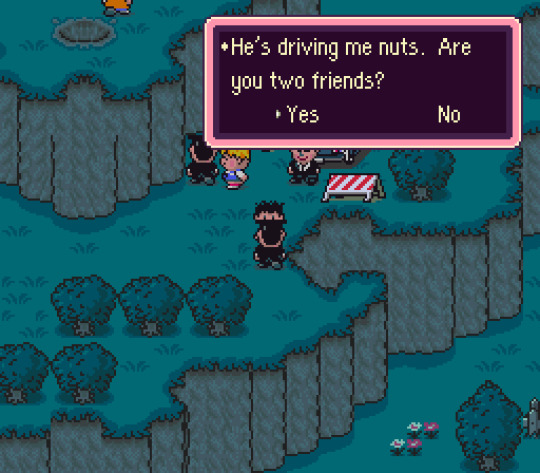
What's Ness's answer?
Yes!
...or no.
I cannot understate how obsessed with this I am.
Ness can't say whether or not Porky is really his friend. This is something he's unable to answer on his own. I really think this is a fantastic way to introduce Porky to the player. If he is Ness's friend... it doesn't seem like he's a very good one.
Now shortly after this, Porky begs for Ness's help in finding Picky. We get a pretty good look at Porky's character here. He's obnoxious, rude, doesn't take responsibility for his actions, and above all is pretty meek and cowardly.
Now, I think some people go a little far in interpreting him as "bad" here. Porky's undeniably a jerk even now, but he's still just a kid, and a pretty pathetic one at that. If you look on the Earthbound wiki, you'll see that his age is listed as 14. As far as I'm aware, this only has one source, being Saori Kumi's Earthbound novelization. If you know even the slightest thing about this book, you will understand how ludicrous it is to use this as a source.
Porky's age is never specified ingame, but I think his overall presentation implies that he should be the same age as Ness. It's fairly well-known that Ness's age is given as 13 in the American guide, but 12 in Japanese. 12 is also the age given in, again, Saori Kumi's novelization, unfortunately I don't know if this is stated elsewhere. It can also be noted that Shigesato Itoi has actually said he never thought of a specific age for Ness, just that he had his daughter in mind who at this time was in grade 4 or 5. So this gives us a range that could be as old as 13 or as young as 9. Personally, I skew toward 11-12 for how I envision the characters.
In any case, Porky's clearly very young, so you really have to keep that in mind when considering... kinda everything about him, actually. But in this instance, it really contextualizes the stuff he says.
For example, if you say no to him when he asks for your help, he threatens to "say something that'll cut you like a knife." I think it's silly to take this seriously (i've even heard someone describe it as Porky blackmailing Ness). He's clearly just gonna call Ness some mean name or something.
...Except he doesn't. Say no to him again, and he'll immediately deflate.
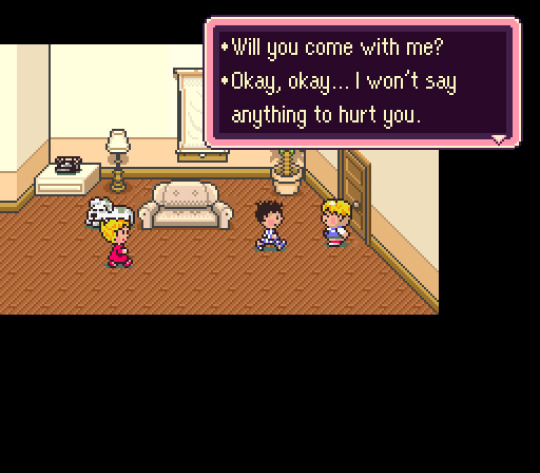
Porky is in no way a bully. He's annoying, but he's pretty lousy at being intimidating. Instead, his favorite way of getting what he wants is to appeal to others' sympathy. He's relying on Ness to help him by virtue of being "his bestest friend." Or think of his actions in battle: smiling insincerely, apologizing profusely, pretending to cry. He plays up being a sweet innocent kid whenever he's in trouble.
So, I think the picture we've painted is of a kid who's sort of a jerk, and tricks others to get what he wants. It becomes pretty clear why Ness isn't sure if he can really call Porky his friend.
...But what about Porky's side?
Is he really only pretending to like Ness for his own gain, or are his own feelings much more complicated?
First off, just some minor things. While Porky leaves a pretty bad, if not altogether inaccurate first impression, there's a few things in his dialogue that speak to him thinking of Ness as more than just 'that loser who thinks we're friends.'
He promises that he'll tell Ness all about the meteorite in the morning. Probably this'd be in his typically boastful Porky-fashion, but even so, this shows that he wants to share things with Ness.
It's easy to miss because most people playing Earthbound have played A Video Game's before, and also tend not to ignore directions the game is clearly telegraphing, but Porky will actually give you advice if you're not properly prepared.
If you don't grab the Cracked Bat:
You're not taking anything on our big adventure?
Why don't you look around for your Cracked bat or something?
Taking the bat but not equipping it:
Sorry about giving you this game-type advice, but you should equip your weapon!
Do you know what "equip" means?
Yes:
Okay, that's good. Be sure to pay attention to details like that.
No:
It means "use" or "wear."
You must equip items in order to use or wear them.
"Equip" is used a lot in games like this,
but you already knew that...
Finally, not answering your dad:
The phone is ringing! Answer it!
At my house, my dad gets bent if I don't get the phone...
within the first three rings!
These aren't anything groundbreaking, but they do show how Porky acts with Ness in casual contexts, plus how the game presents Porky surprisingly neutrally in the beginning, rather than just immediately telegraphing him as the villain. Also, nobody's seen these so hey, some obscure trivia for you.
Finally, Porky's reaction to hearing the prophecy is pretty telling of the kind of character Porky is pre-Giygas. He just talks about how much trouble Ness is in now, how he hopes he doesn't have to come, and how freaked out he is. I think this sums him up pretty well. He's the meek comic-relief friend character. Sniff from Moomin, for example. Or go watch Monster House, because Chowder is literally exactly Porky.
But none of that is super juicy. Let's dive into something juicy.
This little bit murdered my brother when we got to it in our playthrough.
A quick detour to Magicant...
Ness... I envy you.
You have all the luck. I have no luck.
Ness... well, okay...
Let's be friends forever, alright?
still hurts
Yeah so first off, I think this totally clears up Ness's feelings towards Porky.
He can't say if they're really friends...
But he WANTS them to be.
This is Ness's vision of Porky, the Porky he used to know before Giygas corrupted him, and the one he wishes was still around.
But even if this is just a manifestation of Ness's consciousness, I think it also gives us a look into Porky's inner self. This is what Ness sees in Porky, the confession that Porky is too insecure to say out loud. He hides it behind all his boasting and rudeness, but he really, really wants to keep his friendship with Ness.
Well.
If only.
Let's get to MOTHER 3.
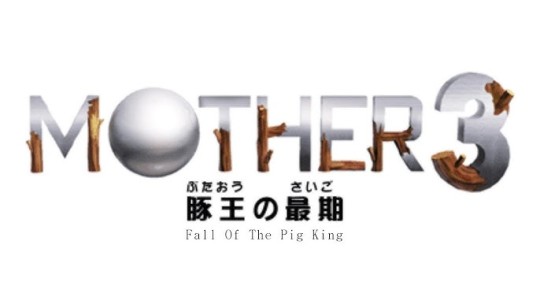
This game gives us SO much more of Porky's character, and it's all sooooo deep. I cannot understate how much I hate seeing Porky reduced to 'that Eric Cartman kid who is an absolutely irredeemable suchnsuch.' King P is the culmination of a lot of aspects of Porky's character arc (you think this post is long, it's only the first of many more...), but one of the most prominent aspects is his unbelievably, painful, PATHETIC loneliness. This kid... man... is so desperate for a friend after he left the only person who ever wanted to connect with him that he literally brainwashes a whole city's worth of people into loving him.
And of course that's not enough, because all he wants is his next-door neighbor, his good buddy, his bestest friend Ness.
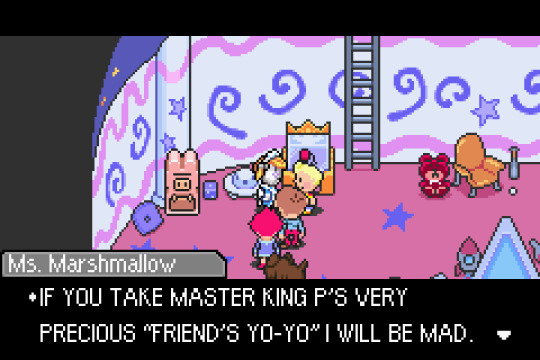

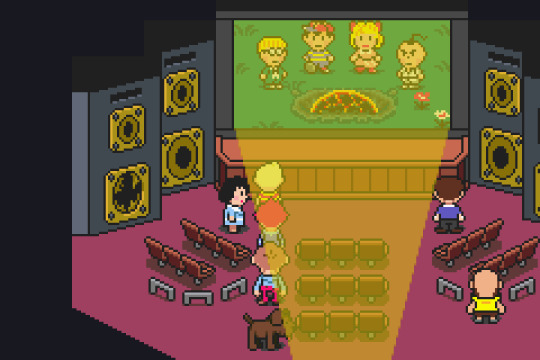

In closing, are Ness and Porky friends? It's complicated. Both clearly, desperately want to be. They have a history, they know each other intimately, by Itoi's own words they literally grew up playing together. But, for a number of reasons (that I've thought all too much about...), Porky just can't help but make it difficult. I'd sum it up by listening to the song that plays during Earthbound's cast credits. In the end, there are good friends, and...
#earthbound#mother 3#mother series#porky minch#pokey minch#ness earthbound#emilyramblings#and holy fudge do i ramble#i just cannot shut up when it comes to porky minch#and there's so much i still need to talk about...
86 notes
·
View notes
Text
[squints at the MCU] Tony Stark has displayed more ability to weather interrogation and torture than Steve Rogers.
This is "(displayed more)(ability)," not "(displayed)(more ability)," to be clear.
(I know fiction’s depiction of torture is famously propagandafied, but in this case, it’s not about torture for information so much as physical traumas shown on screen.)
(Anyway, have a rant I did on discord the other day.)
It's not really so much about "resisted the urge to hand over information" as "survived a truly harrowing experience and still came out of it trying to do good."
Tony's very first movie involves getting repeatedly drowned while in constant pain from bomb injuries as a civilian contractor, and I… don't think I can remember anything even a little similar with Steve
I don't think he's ever been captured for long before breaking out? All his injuries are in active battle, not torture.
Like... Steve went through something horrible with the ice and losing Bucky, nobody can argue that. But I think it's very telling, sometimes, that movie Steve, especially 2012 movie Steve, is completely unaware of the absolute nightmare that Tony experienced in his solo movies.
I have so many feelings about Tony Stark being the epitome of "guy who was raised and manipulated into being a bad person by someone he trusted, and (after a horrible experience) attempts to be a better person, constantly and consistently, even if he sometimes fucks up in the execution."
And the way that some fics elide his experiences in cleaning up other people's messes (first Obadiah's, then Howard's) and how that doubtlessly compounded his many neuroses from fixing messes that he did actually create himself is just
I have a lot of feelings
And am also feeling a little bitter and salty about how Tony Stark's MCU incarnation reportedly took some inspo from Elon Musk... and a little petty and satisfied about just how drastically we've all be shown that Musk can never live up to the idea of 'billionaire with inherited wealth who actually, without hesitation, risks his own life to save millions' that he tried to use PR to achieve in the media with 'my electric cars are gonna save the world' stunts about things he didn't actually have a hand in inventing
I'm just reading some fics I really enjoyed when I was still in the YA fandom, and there was a reference to a line Steve said in the movies and I started thinking (again) about how frequently fans take lines from Steve or Sam about Tony as gospel, because they haven't seen Tony's movies, and the lines from the star spangled boys are contextually meant to show that they don't know jackshit about Tony or his life, because they are directly contradicted by multiple prior films.
Also like... how often Steve's traumas get explored (in fic) in a way that Tony's just... don't? At most, his issues about Howard get explored, but that's it.
There's this moment in CACW that people take as Accurate and it infuriates me.
Tony Stark: [Back in the cell.] Just look. Because that is the fellow who was supposed to interrogate Barnes. [He shows a holographic image of Doctor Broussard.] Clearly, I made a mistake. Sam, I was wrong.
Sam Wilson: That's a first.
Which, like... it's a bad movie. Obviously. But also
That line is immediately followed by Tony revealing that he's here to help the others and is sabotaging the security to make sure Ross can't take advantage, and yet fanfic still uses Sam's quote to promote anti-Tony agendas!
And 'Tony admits he fucked up' is. Like.
Listen to me
Tony's first solo movie is fixing Obadiah's machinations. *
His second solo movie is fixing his Dad's fuckup.
His first team movie is fixing Thor's mistakes.
His third solo movie is fixing something that is only tangentially his fault.
It's not until AoU that the fuck-up is really his and his alone (well, not counting Bruce), and even then, even then, a massive portion of the blame is narratively laid at Wanda's feet!
And only then do we get this man, who has spent five movies seeing what happens when people don't take responsibility for their actions, or have anyone riding them to be ethical, who has criticized himself for neither having that oversight nor providing that oversight for people who snuck shit under his nose, that is when we get Tony weighing in on the side of "most countries on the planet are agreeing with this and it's for a reason, please work with me here, maybe we can get some of it rolled back to be less authoritarian and more reasonable."
* and removing himself from the military industrial complex he was raised and groomed to be in, but that's a system and not an individual act or a set 'villain'
Or as @firebirdeternal put it:
I would say that his first solo movie does have a large element of fixing his own mistakes too, it's just that his "mistake" was Trusting the Wrong Person and not taking personal responsibility for how his actions are affecting the world. (Which, he immediately does upon coming back from being captured? "We're going to immediately stop making weapons, because it's making the world worse" and then when Obadiah cuts him out of the company he goes "Oh. Okay no that didn't work, have to personally fix all this then.")
and yeah it's just
Tony have plenty of reasons to be on the side of "Someone needs to have oversight over this"
IM1 is such a good exploration of someone in privilege saying "this stops now" in a situation where they do have control because they have been confronted with their mistakes in a way that's unavoidable
It's also like, a great example of the fantasy of the Super Hero. Because Tony Stark, the businessman, even with all his wealth and knowledge, isn't able to stop the systemic harm being caused by His Own Company. One person isn't able to do that, even with the best of intentions. It isn't until he becomes something else, something more, a Super Hero, that he's able to make any kind of meaningful change on his own.
Like IM1 is just a phenomenal movie. It understood it's subject material so incredibly well.
And people skip it and then take Steve and Sam at their word about Tony's strength of character and moral convictions and I scream.
THIS MAN FLEW A NUKE INTO A WORMHOLE WITH THE FULL EXPECTATION THAT HE WAS GOING TO DIE
Yeah, like, that Jump on the Grenade mentality is something that he and Steve actually literally share.
They both had 'jump on the explosive to save people' moments in their introductory movies.
I find so much more strength and inspiration in stories like Thor and Tony, where they are inherently fuck-ups and were shitty people and they are trying so damn hard to be better, which is more Tony than Thor really, but both of them and their first movies are just. I find that more inspiring than Steve or T'Challa or any other hero who was already a good person and just Became Great.
Tell me about the person who has to struggle to find that moral choice. Tell me about Natasha dragging herself from her oceans of blood and Tony fighting the government over whether they have the rights to use weapons he's created and about Thor having to reckon with his family's power being born of imperialistic ravaging of other cultures.
I want to hear about the people for whom being good is hard and a choice they don't have to make, but then they make it anyway.
Also I stand by "I am Iron Man. [infinity snap]" being the most amazing bookend the MCU could have done and probably the best part of the Endgame.
#Tony Stark#character analysis#phoenix talks#MCU#Iron Man Movies#Iron Man#Avengers#AoU#CACW#AEG#torture mention
621 notes
·
View notes
Text
Schrödinger's King in the Bird Box
Time for a return to the single topic that most torments me in this entire franchise canon: is Harrow in the goddamn bird or not?
Except not really. I'm not going to go over the evidence again. I've done it before. Almost everyone has done it before. It has only gotten stronger. At the absolute minimum, an attempt was made to put Harrow in the bird. That's not really disputable. I admit it. It's over.

This is actually the second time that I've struggled with narrative cognitive dissonance regarding a real core factor of this show (like not "what's the deal with Archdragon reproduction," but something that is clearly supposed to be thought about with the intent that it will eventually make sense), and eventually managed to rotate it so hard in my mind that the way I wanted to see it slipped out of my grasp and I saw it the way it's actually intended. Ironically, I think I may have been thinking about the Ocean arcanum at the time.
Anyway, what previously always bothered me about this question was mainly two things:
It would have a devastating impact on Ezran's character development if Harrow reappeared during s1-s3, but the timeskip and arc of s4-s5 made it so it would also be deeply weird for him to reappear before the show ends.
If Harrow is in Pip's body, both Viren and Pip's subsequent behavior, as well as how Pip is treated by the narrative on a meta level, make absolutely no fucking sense.
But... if Viren doesn't know whether the spell was successful or not? If we are meant to not know whether the spell was successful or not, because it's not going to get resolved in the show itself?
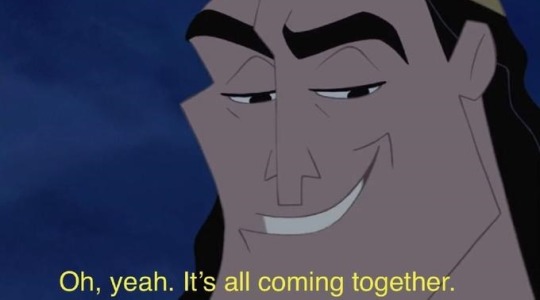
If we accept that the earliest point with any chance of the hooks for this plot being set is late s7—because yes, Aaron Ehasz would do an exact beat-for-beat repeat of Zuko and his mom—that both puts Ezran far enough in his growth for it not to be threatened by the "real" king returning, and keeps Harrow out of the loop for long enough that it doesn't really make sense for him to do anything but step down from the throne in favor of Ezran, anyway. As for Viren and Pip's behavior, if the show isn't going to advance that plot much further during its runtime, there's no reason for us to be constantly reminded of it. The setup has been made, and they can just let it stew because it's not actually relevant.
That being said, Viren's behavior actually does make a lot of sense if "is Harrow in the goddamn bird or not" is a question that is also tormenting him. To that end, I'll be doing some digging here on the nature and context of the body-switching spell, Pip/Harrow's behavior post-swap, and what the hell is going on in the Harrow section of Viren's dark magic dream.
The Spell is Made Up (Unlike All Those Real Spells)
First of all, I think there's been some long-term incorrect assumptions made about the body-switching spell. It's not a known spell: this is Claudia and Viren essentially flying by the seat of their pants... but we rarely stop to think about how that contextualizes the rest of the discussion around it.
The initial plan is to find the assassins and ambush them before nightfall. As Soren points out and Viren himself confirms: if they fail, the assassins will be unstoppable under the full moon and Harrow is as good as dead. Claudia decides to put her mind to that problem, so naturally she stops to flirt with Callum in the library and gets the inspiration for the spell from something he says.


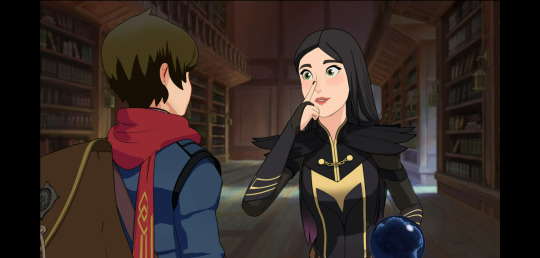
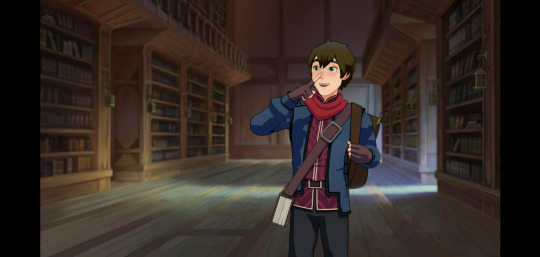

(Fun fact: none of that happens in the novelization. Zero amount.)
She brings the idea to Viren, and they develop the spell from there. It's not really clear if Claudia actually knows whether something like that would be possible, but Viren does know that transferring the essence of a person can be done—he's got a nice little coin collection that proves it.
As for the snake, there's no way Viren "acquired" a two-headed soulfang serpent because he has a book somewhere on how to use a rare, malformed specimen of a dangerous Xadian creature to switch people between bodies. He probably thought "that's weird, but could be useful," or maybe whoever sold it to him just had a great sales pitch. A non-trivial amount of success at dark magic is in having access to rarer and more powerful reagents than your competition.
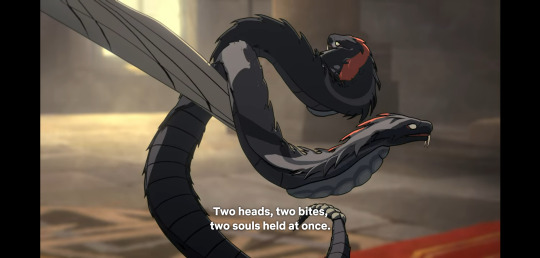
Anyway, what this means is that Viren has absolutely no idea what success looks like for this spell, particularly when using it on subjects of different species. When he describes it to Harrow, he is 110% talking out of his ass. He sounds like he knows exactly what the spell will do and how, and I think a lot of us kind of fell for that. He needs to sound confident, because if he admitted that he doesn't know if it will even work, with a possible failure condition of "snake eats your soul," well... a) Harrow rightfully wouldn't go for it, and b) he'd look incompetent, which is the worst thing ever.

When he goes to Harrow's room, he casts the spell... but did it work? I think that whatever it did, it did it in a way that Viren can't tell whether it worked or not. Maybe both Harrow and Pip passed out. Maybe Viren just didn't want to hang around for the aftermath—in the novelization, when he exits the room and runs into Callum, his eyes are still black from spellcasting.
Activities of Dr. Pip Harrow, Ph.D.
Probably the thing that has always bothered me the most about the entire Harrow-Pip theory is that yes, literally everything in the lead-up and immediate aftermath of the assassination points to that being exactly what happened... and then the narrative lens of the show completely drops the rope. Pip doesn't even appear in the novelization until Viren's pre-coronation scene, which is funny given his looming presence over half the scenes with Harrow in the show.

Pip appears exactly twice after the assassination—once in s1 and once in s2—otherwise he goes completely ignored. He's not in the background of Viren's office, or the throne room, or Harrow's bedroom. No one ever mentions him ever again. Ezran never mentions him again, in the show or in any supplementary materials. You'd think the boy who can talk to animals might have some interest in his dead dad's beloved pet... but who knows, maybe Pip has always been an asshole and Ezran's actually like "thank goodness I never have to speak to that dude again."
Anyway, in all of Pip's appearances, he behaves like... a bird. A trained bird—Harrow can rely on him not just fucking off—but he doesn't demonstrate human-like intelligence the way Bait does. That being said, Bait is essentially a main-cast character (at least as much as, say, Corvus... maybe even Soren) while Pip is a plot device, and even then it takes until well into the first arc for Bait to show the kind of complex reasoning and initiative that separates him from an unusually smart dog. Pip's human is also a stressed-out king, rather than a rambunctious ten-year-old, so he's probably a bit more sedate overall. I would personally bet, given the way the show has progressed with regard to Xadian creatures, that Pip is as intelligent as Bait.
The point of that is: even if Harrow's consciousness is occupying Pip's body, he's not really doing anything with it. He's pissy, sure:
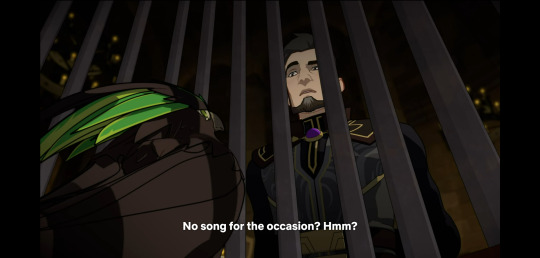
But is that Harrow's pissy-ness or Pip's? Even if Pip is only as intelligent as a trainable bird, that's plenty intelligent enough for both grieving/confusion that their human is gone and holding a grudge against obvious assholes. Viren cages him, but is that because he flipped out and got bite-y? And was it Harrow flipping out, or Pip? Or is he caged just because Viren's of the general attitude that animals belong in cages? Those who fail tests of love... We just don't know.
A lot of us also, to circle back to assumptions about the spell, have tended to think of a body swap between Harrow and Pip resulting in Harrow flailing his arms around wildly and screeching... but again, we know literally nothing about this spell, nor do we actually know anything about Harrow's behavior after Viren leaves his room. Maybe his body sat catatonic on the bed until Runaan came in and shot him. Maybe Pip, being intelligent, was able to maintain the facade—once everyone's in the heat of battle, it would be hard to notice even significant deviations from normal behavior. Even if "Harrow" appeared to fight only halfheartedly, or give up entirely... well, he hasn't been the same since he lost Sarai. Maybe the spell only partially worked, and only half of his soul is inside Pip, with minimal or no influence over the bird body's behavior.
Viren does appear to take some precautions in case Harrow is alive inside Pip. The cage, for one... but he also has nearly all subsequent important conversations outside of his office. Like I said earlier, Pip's cage isn't rendered in the background of any scene, but since he escapes from Viren's office I'm assuming that's where he's been. Even if Pip was just out of frame in every scene in Viren's office post-assassination through end of s2, the only things he's seen are... Viren eating butterflies, and the conversation between Viren and Claudia about the mirror and her side mission to bring the egg back at all costs. He doesn't know about Soren's instructions to murder the boys. He knows about the mirror and Viren's obsession with it (which he could have known before), but he doesn't know about Aaravos. He may know that Viren stole his seal but only if Viren was stupid enough to stamp the letters with it in front of him (which... look, he could be). The only things he's really learned are that a) his sons are alive, and b) Viren lied to him and the egg is alive.

Now, realistically, if we were meant to hang on to the is-Harrow-in-the-bird plot thread because it's going to be significant within the scope of the show... I'd be expecting to see at least one cut to Pip glowering at some point during all these machinations. If it weren't for the mirror and Aaravos, I'd expect Viren to be yelling all his monologuing at Pip, too. But the show does none of that. Instead, the next time we see Pip, we see him peace-ing out of the show for at minimum the next three seasons, and possibly the remaining two, as well. If Harrow's in there... why? Did he go to find Callum and Ezran himself? It's not actually clear that he knows Ezran can understand animals, so it would be reasonable for him to think Viren is his only chance at ever not being a bird again. Maybe he thinks that chance is gone with Viren's arrest and would rather not spend the rest of his life in a cage. Maybe he really isn't in control of the body.

Back to Viren, though: since Pip refuses to demonstrate any behavior that could be taken as distinctly Harrow's, Viren actually has no idea at any point whether Harrow's in there or not. He doesn't know if Harrow lived. He doesn't know if he succeeded or failed. It's a constant reminder that he's almost, but not quite, in control. Almost, but not quite, good enough to achieve what he wants.
It probably drives him absolutely insane.
Did You Think You Were Somehow Getting Out of This Without Me Mentioning Kpp'Ar?
Just kidding, it's finally time to talk about Viren's dream. We've gone two entire seasons and a two-year timeskip without any mention of Harrow or Pip (though those maniacs dropped the fucking snake basket on us as an incidental but obvious prop early in s4), and then suddenly we get punched in the face by Viren's subconscious.
First, though, I do actually need to point something out in the scene with Kpp'Ar. Bear with me, I promise this is relevant.
Viren sealed Kpp'Ar's soul in a coin 12-ish years ago, and the coin has been sitting collecting dust in his secret dungeon for... some amount of that time. Now he opens the door and finds Kpp'Ar standing there, free—and I will note that I don't believe Viren actually knows how to free people from the coins, or whether it can even be done. His reaction is surprise, followed by suspicion and wariness:


When he encounters Harrow—dead—his reaction is horrified shock, which is fair since the last time he entered the room that way there was no surprise body chilling out waiting for him in it:

Then, when Harrow speaks to him, suddenly alive and unharmed, he drops straight into relief:
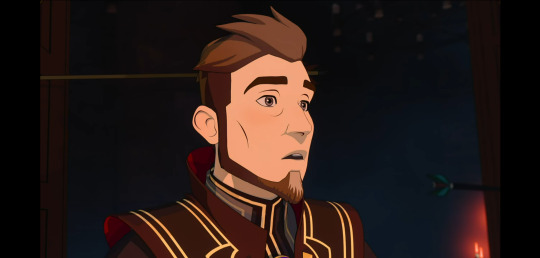
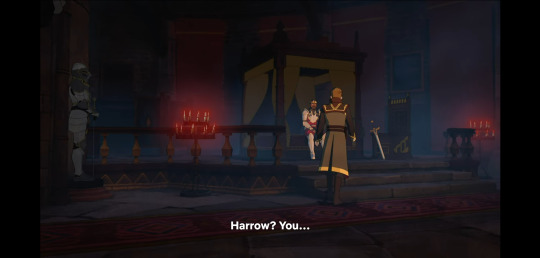
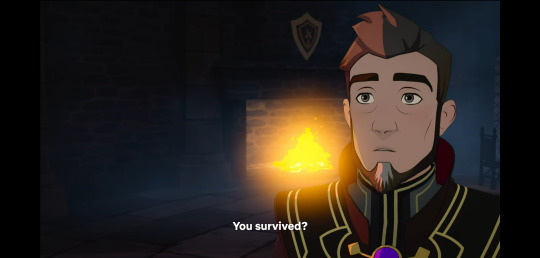
Some of this is undoubtedly due to the differences between Viren's relationship with Kpp'Ar and his relationship with Harrow. With Kpp'Ar, after that initial moment of confusion, he's absolutely determined to not show a single hint of ignorance or weakness—this is a trick, or a test, and a passing grade in "light verbal sparring with the mentor you're pretty sure you remember betraying" is a thing that is both normal to want and possible to achieve. For Harrow, who he wants so desperately to call him brother, who he walked into this very room ready to die for, before everything went horribly awry—he not only immediately and willingly goes to his knees, he literally prostrates himself.
... I'll give everyone a moment to get all the innuendo and suggestiveness out of their systems, because that's not the point. This time.
What is the point is that Viren's reaction to Harrow isn't disbelief, but relief. Hope. Kpp'Ar is supposed to be in a coin, and Viren immediately questions how he got out. Harrow is supposed to be dead but Viren doesn't give a second thought to how he's not. Fortunately, Harrow helpfully explains:
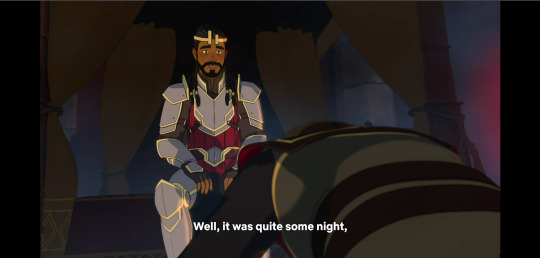
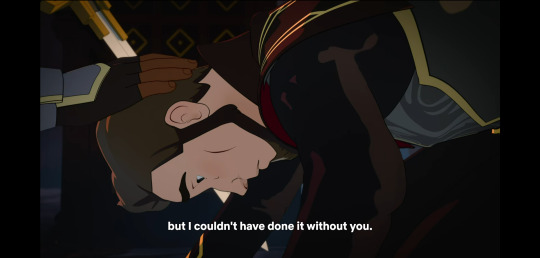
Fun fact: back in s1, we don't actually see Viren actually taking action against the assassins. We don't even see evidence that he re-entered the room at all—it's only Soren and Claudia who participate in Runaan's capture.
I haven't actually touched a lot on the complex shit going on for Viren, emotionally, throughout all of this—I mentioned it's was probably driving Viren insane over the course of the first two seasons, but let me elaborate. If Viren successfully switched Harrow and Pip, that means Harrow survived... but he expressed his feelings on the proposal in no uncertain terms, and there's a good chance he will literally never forgive Viren. I don't think Viren thought far enough ahead to consider how to get Harrow into a human body again, but I do think he's dragging his feet on it a little because if he can work things to his advantage—unite the Pentarchy against Xadia and follow through on the war Harrow was avoiding—he'll prove to Harrow that he was right all along. Any chance of that flies out the window with Pip at the end of s2.
If the body-switching spell failed, it means Viren essentially killed Harrow himself. That's the reality I think he grows more and more resigned to over the course of s1 and s2, when Pip remains unresponsive. He had no choice but to take the best chance at saving someone he loved—but this time, instead of saving Harrow, he murdered him.

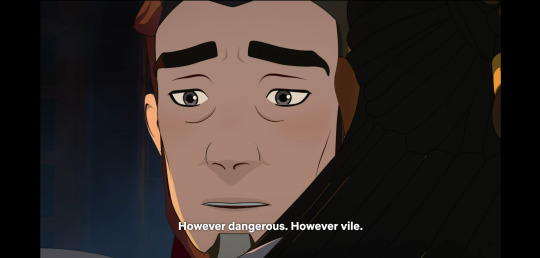
In the dream, Harrow has not only survived, but credits Viren with his survival. He doesn't just dismiss Viren's show of remorse, but makes his own apology to Viren. He calls Viren brother. After an impossibly long nightmare, everything is okay. All is forgiven. Maybe there was nothing to forgive, in the first place. Maybe Viren was right all along.
Then it all turns sinister with the callback to the coin incantation, and we have a sharp return to reality:
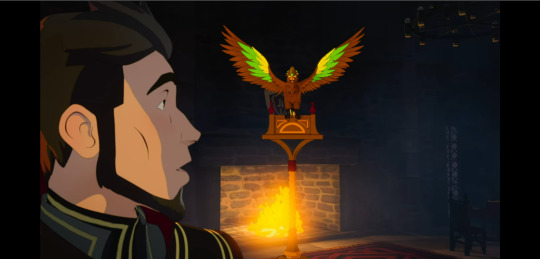
The cinematography here treats Pip a lot more like how I would expect him to be treated in s1/s2 if we were meant to know he was actually Harrow. There's focus actually on him, instead of just other characters' reaction to him. He "speaks"—as I noted in another post—in raspy sounds very unlike his songbird chirps from s1. This is absolutely Harrow as Viren actually left him—even if he's not dead, he's in a warped prison of dark magic, a perverse mockery of himself.
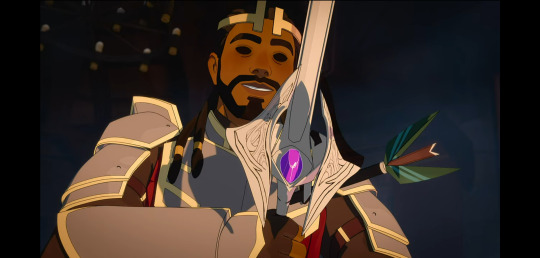
Oh wait.
Harrow-who-is-both-human-and-alive was never an option, and what we've got now is mirror images of Harrow-the-dead-human and Harrow-the-live-bird, and they're going to do to Viren what he did to them.
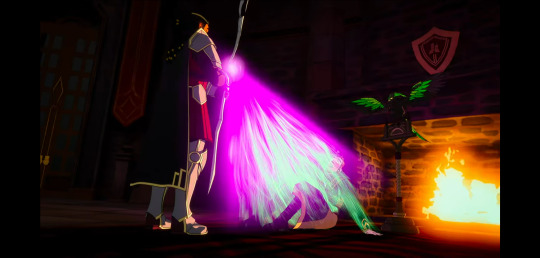
Now, it's not that none of this makes sense if Viren knows for sure that Harrow is in the bird... but it makes a lot less sense and has less emotional resonance. If Viren knows Harrow survived as Pip, he'd be more likely to question Harrow's human form than his survival—the way he does with Kpp'Ar. He might be more guarded, expecting hostility—which, I will note, is what he gets when Pip enters the scene. Instead, because until now he believed that he actually killed Harrow in his attempt to save him, he's so relieved to see Harrow alive that for that one moment he loses all pride and is ready to beg for forgiveness at Harrow's feet.
Since legitimately none of this makes sense if Viren didn't at least attempt to put Harrow in the bird, we're left with Harrow maybe or maybe not alive, Viren having maybe or maybe not been the one to actually kill him (gonna be a fun one with the Runaan context), and a plotline that is definitely not going to be resolved in the remaining two seasons of the show. I'd be kind of surprised if they even did any more setup for it (like Callum/Ezran finding out it's a possibility, or even a hint drop like Runaan being all "it was fucking weird, he just sat there" or something) outside of future supplemental media.
Conclusion
Either Harrow is alive and in the bird, with the future intent being to do a spinoff story The Search-style, or we're in for a huge bummer of a "actually, it was Viren all along who killed Harrow, therefore Runaan is a good guy and we can all be one happy family" pile of absolute bullshit. Yes, they said Harrow's dead. Harrow's body is dead, we knew that all along. There's a note in the artbook that Viren was actually going to rip the shroud off at Harrow's funeral in order to publicly prove it's his body, because that is an extremely normal thing to do.
The show just treats it extremely weirdly because, even as the only person with any chance of knowing, Viren is in the same uncertain boat as the rest of us. (Actually more uncertain than the rest of us, since he's not genre-aware.) Also it's another chance to torment Viren emotionally, and they'd never pass that up.
Thanks for coming to my absolutely ridiculous TED Talk on this topic, I hope this screenshot now does as much psychic damage to you as it does to me:

#the dragon prince#viren#harrow#pip#for once i was wrong... but now i'm right#oh my god this is so long i'm so sorry
88 notes
·
View notes
Text
you know it's taken for granted by a lot of fandom that Ratchet taking Pharma's hands after he's (believed to have) died is some kind of hideously fucked up thing or whatever, but we get plenty of contextual suggestions that this is... like clearly not 100% above board culturally, but not remotely on the same level as it would be to steal body parts from a corpse for humans. hah. like. the implication is clearly 'bit dickish and gross in this context, but cybertronians are a Lot chiller about recycling bodies by virtue of their being robots' as opposed to something more like 'this is equivalent, morally, to if you desecrated someone's corpse as a human for organ theft purposes'.
characters don't fail to respond to what ratchet does as clearly horrifying because the comic is excusing some great sin on ratchet's part; it's just clearly not nearly as strong a taboo for robots. we know they scavenge/recycle corpses sometimes, at least post war! we know it's gross but hardly unthinkable to use a dead body's vehicle mode in a tight spot to escape! all that kinda stuff we see.
so i really think sometimes people kind of overstate the 'ratchet took pharma's hands' thing tbh. it's enough of a dick move that pharma being mad about it makes sense, but it's clearly not. the same level of horror. they have interchangeable body parts and the ability to create new ones, no way they see it the same way anyway.
71 notes
·
View notes
Text
So the Official Dropout Preview tells us we’re getting into Kipperlilly’s backstory this week, which means it’s time to go full Pepe Silvia on the Rat Grinders and try to figure out their motivations before all our theories and predictions collapse like a house of cards getting smashed into during a shrimp jump!
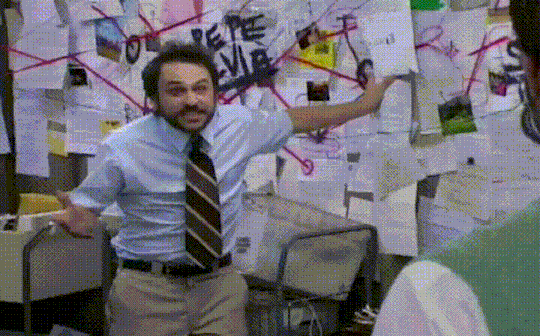
So Kipperlilly has anger issues and some sort of fixation with Riz Gukgak. She’s also pretty clearly the leader of the Rat Grinders; I’m betting it was her call to kill Gavin and Buddy Dawn during the Last Stand. I’m also betting that she’s the one who killed Lucy Frostblade in the woods when she died.
Given that last little bit of theory, it’s completely possible that the rest of the Rat Grinders are terrified of her and are going along with things in order to not get murdered themselves for getting in the way of Kipperlilly’s obsession.
On top of that, three of the remaining Rat Grinders have some specific contextual shit going on that may be affecting their judgement:
Oisin is a wizard, and like Adaine needed to come up with a LOT of money to afford wizarding classes this year. Unlike Adaine, he is still in the good graces of the family money, so resources weren’t an issue. The thing is, though? The source of that scratch is a dragon’s hoard, and Brennan recently offhandedly confirmed (via Fabian’s tattoo) that dragon madness was still a thing in Spyre. As such, since Oisin is explicitly using a dragon’s hoard as a resource this season, it’s entirely possible that he’s suffering from dragon madness this season and isn’t in complete control of his faculties. He might legitimately be a decent Dragonborn who’s friendly and into Adaine while simultaneously not being able to connect the dots about how his other actions are hurting her and her friends.
Mary Anne Skuttle is admittedly my blorbo this season, so I know I’m biased. That being said, she don’t give a shit and she’s somewhere on the spectrum like a lot of us, so it’s not unreasonable that she simply hasn’t noticed yet that Kipperlilly’s plans are sinister as fuck.
Finally, Reuben has some sort of messed up dynamic going on with Jace Stardiamond, to the point that his own (quite sketchy uncle) has raised concerns. Could there be some manipulation going on that’s pushing him in this direction?
Ivy Embra, on the other hand, does not have any obvious reason for fucking around with Fabian’s heart and his party. Her I find to be really suspicious, and I would not be surprised to find out she’s actually been pulling strings this whole time.
So! I look forward to finding out how entertainingly wrong I am on these points this week; I do hope I’ve called at least one thing right in my analysis here!
60 notes
·
View notes
Note
Thoughts on Strohiem? (From Jojo)
It’s… rough. I have OPINIONS ABOUT HIM.
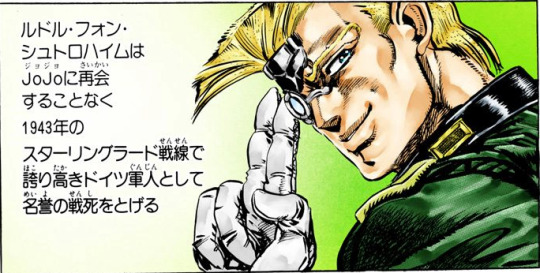
For those unaware, or have forgotten. This particular ask is about the character of Rudol von Stroheim from Jojo’s Bizarre Adventure. A Nazi Major that is introduced in Part 2 of the series. I have always wanted a proper moment to spotlight how much I dislike this character. And not just how I dislike him as a character, but how I dislike his general inclusion in the story as well.
Listen, I LOVE this series. But even I have my limits. It’s because I love it so much that I critique aspects like this in the first place.
Warning, I’m about to word vomit about this because I’ve been DYING to talk about this somewhere.
BIG DISCLAIMER: These are my thoughts and mine alone. I know there’s a lot of… interesting anime fans out there that might disagree. I’m not here to debate on stuff like this, I don’t want to hear your contradictory thoughts on the subject. If I see a single person say I’m “virtue signaling” by saying I don’t like the Jojo Nazi character, I am going to mail you a pipe bomb (in the hit game Minecraft for Windows PCs)
Stroheim’s existence (or at least, how he currently exists in the story) is not handled all that well in my opinion. Like… not at all. I like to poke fun at it, but I genuinely think Araki fumbled the bag so hard with Stroheim and it's more and more unbelievable the more I think about it over time.
No matter how you shake it, Araki fully wrote a historically accurate Nazi character into Battle Tendency and proceeded to give him a redemption arc and make him a member of the supporting cast. Now of course, I know that Japan has a fascination with a lot of German stuff, so within that context I can kind of get why he exists in the way that he does, but it just feels weird and in bad taste.
Contextually, it makes sense. Do I like it? No. No I do not.
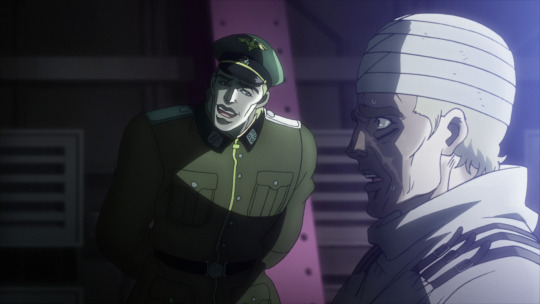
To address the elephant in the room, I get it. Araki really loves to write evil villain characters, and then having them be redeemed, or switch over to the hero's side after a certain point. I actually really enjoy this trope especially in Jojo! It’s one of my favorites. Especially how it’s handled in Part 4: Diamond is Unbreakable.
However, writing a redemption storyline for characters like Okuyasu and Rohan is fundamentally different from writing one for Stroheim.
First and most obviously, unlike other characters, Stroheim’s whole character is based on an actual real life totalitarian extremist hate group who committed horrible atrocities across history (and still does to this day).
As if that wasn’t enough, he quite LITERALLY commits horrible atrocities ON SCREEN. Sacrificing an entire room of innocent people to Santana (the first of the Pillar Men) so that the German’s can awaken and study him in their secret lab.
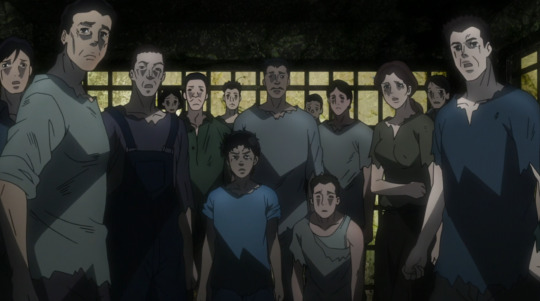
Everything about Stroheim feels like it’s very intentional at the start. He is clearly set as a villain from the beginning, and it works fine. However once he self-immolates and blows himself up to destroy Santana, the story seems to continuously frame him more and more as an ally/hero from that point onward.
After he returns with his cyborg body, the fact that he’s a Nazi suddenly takes a back seat and now he’s continuously just framed as a “patriotic” soldier. Legit, the moment after he shows back up, Joseph internally comments on how he’s “not exactly a bad guy”.
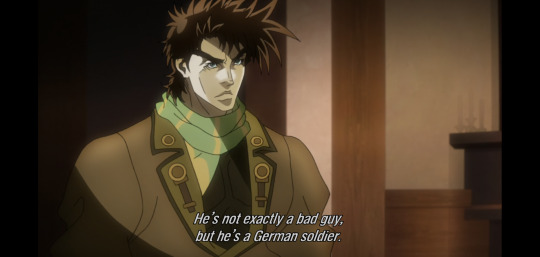
Some people will argue on how it’s a bit more complicated than that, since Joseph also thinks about how he dislikes that he’s a German Soldier. But directly after this, he also states how he’s still happy Stroheim isn’t dead. If anything, from this point onward Joseph acts towards Storheim in a similar way to how he acts towards Caeser. Even if they aren’t best friends, Joseph still has positive feelings towards Stroheim, and I hateeeee that.
In the anime, they even make sure to call him a “German Soldier” and not a Nazi. The avoidance of that word really struck me as them trying to avoid that subject because they knew the way the character was treated was strange.
So anyway, as I was trying to say. Redeeming villain characters is one thing, but redeeming a villain character that is straight up a literal Nazi is something else entirely. Especially when like, not to nitpick, but Stroheim never walks back the more extremist beliefs that he for sure subscribes to.
-And if you’re one of those weirdos who tries to make a point by saying “well, he never outright says what he actually believes in! Maybe he is just fighting for Germany for his own reasons.”
My dude, he’s literally described as a “Patrotic Nazi”. What the fuck do yoU THINK HE BELIEVES IN?
Also as a final addition to this rant, I also don’t quite like how weirdly normalized that Araki makes the existence of “german soldiers” in his story even outside of Stroheim. Nazi’s are weirdly commonplace throughout the plot, and while it contextually makes sense since they kicked off the main conflict, they are almost always weirdly painted as neutral or even straight up good guys (after the Santana fight). Which is just really strange to me.
Like bruh, you mean to tell me that Caeser fucking Zeppeli is casually frieNDS WITH ONE OF THEM? BE FUCKIN FR ARAKI LOL
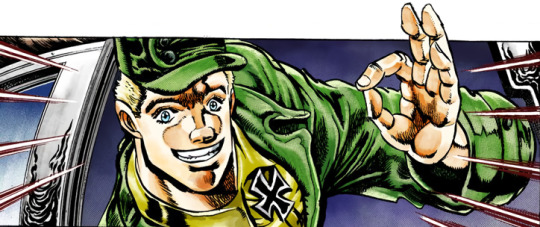
It also sucks how Stroheim is so increasingly present leading up to the final act. Like MAN, GET THIS MOTHERFUCKER OFF THE SCREEN.
The only good thing about the inclusion of Nazi’s after Stroheim’s initial sacrifice, is that we get to see the Pillar Man murk a shit ton of them on screen. Like, fuck yeah dude. A great way to power scale and show how powerful the Pillar Men are as antagonists, without me feeling bad that they killed a bunch of people to do so.
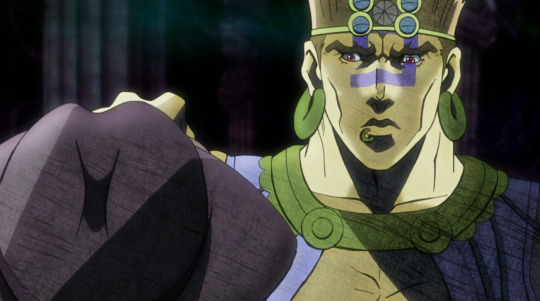
Anyway, that’s my 2 cents that nobody asked for. I still LOVE Jojo, I think it’s a masterpiece of its genre, but it’s because of my intense love for it that I criticize it’s missteps so heavily. I hope that my wording on this post is done well, I had to re-draft it a second time after accidentally deleting it once, so I have a feeling it’ll come off a bit scrambled.
That being said, thanks for the Ask!
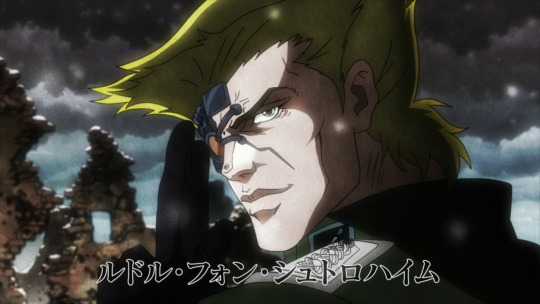
256 notes
·
View notes
Text
soukoku fics: recs and reviews
look, i really like fanfiction. and i've always felt people sometimes don't give good enough reasons to actually read a lot of it. if you scroll down enough, you'll see i did that too. so i thought i'd help out some people that don't know what to read tonight. you'll notice i took my reviewing seriously hgdsafvkhagsv
i'll add more in my reblogs as i go on with this review style, but for now, here are three fanfics that pushed me to do this.
fair warning, they're long ones.
A Lesson in Thorns by arkastadt
Word Count: 454,556
Tags: Arranged Marriage, BSD Beast!AU, Canon Divergence, Slow Burn, Character Death, Heavy Angst, Happy Ending, Ghosts, So Much Smut
Review:
As one of the longest fics I’ve ever read, it took me three days to read it, and a lot of lost sleep. A Lesson in Thorns is a journey that no one is truly prepared for. It’s surprising, I think, how one only notices the slow burn in the beginning, and forget they didn’t start out together in the end. So many things happen in the span of those fifty chapters, and so many feelings arise alongside their events. The reader watches Chuuya grow into himself, despite the haunting (hehe) that surrounds him by the end. Dazai becomes a man wishing to live, despite becoming a ghost of who he used to be. It’s quite magical, the way the story builds upon itself. What is usually some home, this piece makes an empire.
This author appealed a lot to the wants and needs within these characters, making a paced build up to the challenges the characters face. Furthermore, there is a wonderful line of thought that is unwavering, consistent to the very end. The reader meets Chuuya getting ready to be married. A deal has been struck with the Port Mafia, and as the leader of the Sheep, Chuuya must marry their boss. A questionable and confusing task, but Chuuya has no more cards under his sleeve, and he has to save Shirase from the pending prison sentence. He walks into where he is to be married, looking to find a wrinkled, aging man. Instead, he faces the bandaged limbs and cunning eye of Dazai Osamu, and the story truly begins.
The reader already knows it’s not a choice left for random that Dazai takes Chuuya under his wing. It’s already stated that on the first day in his position as the boss, right after killing Mori and sixteen months before he and Chuuya marry, he finds the redhead. A search that is broken down as the story unravels, and an effort that builds them and breaks them apart and puts them back together.
This fanfic is clearly derived from a lot of the factors pointed in Bungou Stray Dogs’s BEAST light novel, which in my eyes makes it all the more interesting. I tried to give a short insight into the beginning with as much care as I could without creating any spoilers for the reading. I guess from me, all my notes just say it’s worth it. This fic really drags you through so many stages of feelings and excitements, and it builds off from them until you reach a new peak all over again.
On Deathless Feet by AbsoluteNegation
Word Count: 71,848
Tags: Caretaking, Controlling Arahabaki, Canon-Divergence, Port Mafia and Post-Port Mafia, Smut
Review:
There are some stories that find themselves tucked into a hidden corner. It does not make them any less, and it does not make them any better, it just makes them quiet. Which in turn, when they are finally found, makes them all the more surprising. That is how I feel about On Deathless Feet, tucked in a corner of Ao3, and all incredibly surprising.
Written with a nonlinear narrative, the reader meets the famed Double Black in different moments, recently met, in the middle of their rise through the ranks, at the brink of their end, after their disconnection with years of silence. AbsoluteNegation makes a wonderful story threaded in different moments, contextualizing their uncomfortable return to each other with interruptions back to their old lives before Dazai’s split from the Port Mafia. The author mainly focuses on Arahabaki, and Chuuya’s relationship with understanding the singularity as it slips out of control. Dazai is sent in to help counter it throughout their time together, and long stretches of contact are needed to get it down to normal.
With a state of constant carataking, the two are thrusted into communion, needing to learn to accept living with each other for the time being. It isn’t a foreign feeling, seeing the other there, but at the end of the day it’s hard for the two with all that past. A past the author explores in detail just as much, not holding back on making it layered and pretty and very intense. They are creatures of passion, that’s what drives this ship and makes it so loved, and the author doesn’t shy away from building on it. Just as well, however, does the author place their own touch to their relationship, with the care and devotion the two also experiment between them. This fanfic is a welcomed balance to the rockier roads often explored surrounding these two. It never lacks sharpness, but it definitely warms the heart.
music for our funeral by itotypes
Word Count: 67,723
Tags: No Smut, Angst, 70s, Musicians!AU, Drug Abuse, References to Child Neglect, Songwriting, Artistic Lyricism
Review:
Music for our funeral by itotypes is a breathtaking composition, and there is not much like it. Set in the 70s, the author explores the surrounding setting of the rock genre, and writes a story of struggle and connection. Starting out with a run-away teenager, we meet Dazai’s lackluster perfection, the narrative often picturing him as a clinical artist. After leaving home, we watch him make himself something, and see him survive until he looks to live. Meanwhile, the other side of the piece plays with a striving perfectionist, and a reckless guitarist, in the form of Chuuya. The man comes from a struggling family (a stark contrast to the origins of his partner), and finds himself lost in the music.
An interesting part of the story is that we get to know the characters before they meet. In a way, it allows the reader to explore the lives privy to the explosion, and before the pining and intensity that sparks between the two. One of the most appreciative factors that make this story one of my personal favorites is the usage of images throughout it. With beautiful lyrics exploring the essence of a character’s beliefs without them needing to admit it to themselves, there is a clear view into the conflicts and selfish needs that each character has.
This author’s work is best described as an ode to music. It comes as a surprise at times, the way words fit together in reverence to this branch of artistry. Yet the fact that it’s done through another form of storytelling, through the use of words on a screen instead of notes on one’s ear, makes it all the more captivating. There is no question this is a must read.
#i read and review and rant#i have no idea if anyone wants this#i have no regrets writing this tho#bsd#bungou stray dogs#bsd chuuya#bsd dazai#chuuya nakahara#nakahara chuuya#dazai osamu#osamu dazai#soukoku#skk#skk fanfiction#soukoku fanfiction#fanfic recs#fanfic recommendations#fanfic reviews
57 notes
·
View notes
Note
sokka's real character development was him going from wanting to eat momo for dinner to being willing to jump into appa's mouth to save momo
but seriously, you have the best takes in the atla fandom. so many ppl don't take into account the effect of a hundred years of colonialism, attempted genocide and imperialism on characters, beliefs, cultures etc.
haha yes sokka is totally that grumpy dad (although in his case, more like a teenage grandpa) who’s like “if you’re gonna keep this pet you have to be the one to take care of him he’s your responsibility so you won’t see me taking care of him for you okay” and then almost immediately bonding with momo on a deep spiritual level. like seriously, sokka and momo are such an underrated duo. i know it’s easy to think of momo as aang’s pet bc aang finds him, names him, and he’s from aang’s temple, and like, to that extent, momo is obviously aang’s, but i do think that momo is equally sokka’s. they co-parent him.
although i will say i’ve always felt like the “get out of the bisons mouth” moment isn’t really sokka genuinely fearing for momo, he just has a lot of pent up stress in that moment and misplaces his manic energy. when he’s stressed about something not in his control he tends to get really frenetic and loud and dramatic for a short burst, just as a way of releasing all that energy i guess. i suppose this habit makes for funny moments, but if you trace the pattern it’s not just a comedic device (although it is of course that), it’s actually a consistent trait of his character as he responds to overwhelming stress. which is pretty cool i think.
and thank you! i think everyone comes to this show with a different perspective and different analytical lenses, and at the end of the day, it is a cartoon that most of us watched as children (although i do have a sizable number of friends who watched it for the first time as adults and absolutely loved it), so i can’t really fault people for being reductive in their interpretations, although as someone who has spent so long dissecting the show, i do think i have earned the right to find it annoying. i will say that i think the baseline framing one needs to understand atla is an understanding of us imperialism, and specifically the war on terror/iraq invasion. i think that distance from that time has allowed newer audiences to forget crucial context in which this show is situated.
obviously reading some postcolonial theory and feminist theory (and im certainly not going to claim i’m an expert in either) would probably also help a lot of people better contextualize their readings, but i have also seen analyses from people who clearly are familiar with the cultural contexts informing atla, and who nonetheless produce rancid takes. criticism is obviously subjective. and while it’s always nice to hear that someone likes my perspective, i am well-aware that many people hate what i have to say on atla for whatever reason. for some reason, this show breeds many divisive arguments, but i think that’s just a testament to how deeply it has touched people’s lives, that they care enough to send each other death threats over which boy katara should kiss or whatever. lol
#twitterpat#asks#also ‘attempted genocide’ ?#seemed like pretty effective genocides to me!#sokka#<- love to overanalyze this guy . the bitch#momo&sokka#aang&sokka#aang&momo
85 notes
·
View notes
Text
Wolfwood, the Symbolism of the Punisher and Tragic Narratives
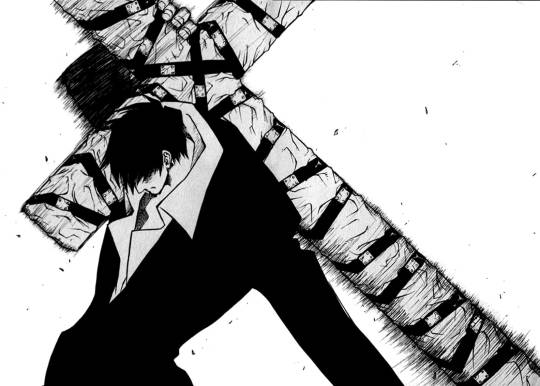
ID: A shot of Wolfwood carrying the Punisher.
MAJOR MANGA SPOILERS
Considering that my post on Wolfwood being a tragic character is doing the rounds and people seem to adore it in the most horrified manner, I thought it might be fun to point out some of Wolfwood's 'dead-since-the-beginning' motifs, specifically through what the Punisher signifies.
Symbolism of the Punisher
There are five (from what I've pulled out) things the cross-machine gun of the Punisher symbolizes. First and foremost, I'm going to talk about how the Punisher, in it's shape of a cross, represents Christianity and Christian morals. This is something that is highly ironic, as while it shape symbolizes the morality and salvation of Christianity, of forgiveness and unconditional love--and such missives as 'thou shalt not kill'--it is also clearly a specialized weapon created specifically to kill people, violating the assumptions of Christian morality.
In a way, this irony or contradiction reflects Wolfwood's own irony; outwardly looking like and pretending to be a priest with Christian morals while at any closer inspection is clearly an assassin. However, the inverted is also true; although Wolfwood is an assassin and kills people, it is shown through his moral quandaries, that these Christian ethics are ones that Wolfwood subconsciously believes in, but has rejected to survive in the world. As a result, the Punisher symbolizes the irony and contradiction of Christian ethics that Wolfwood carries.
Interesting side note, Chapel directly says that their actions as assassins--executing people with their machine gun crosses--is mercy and leads them to save themselves and others to redemption, much in the same way humanity was redeemed through the cross in Christianity, which is the excuse that Wolfwood carries with him for killing others; but that's a digression from what I want to talk about.
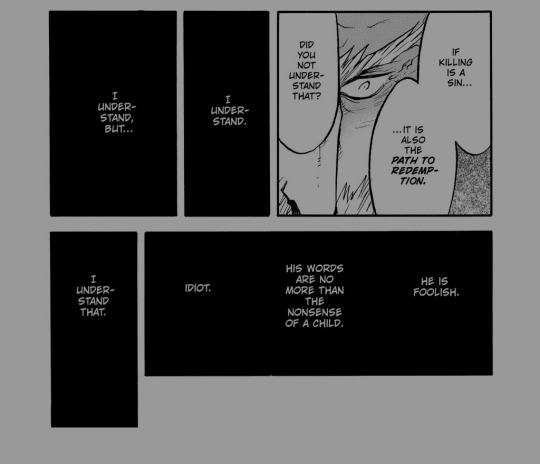
ID: Chapel says, “If killing is a sin... it is also the path to redemption. Did you not understand that?” Wolfwood, through black panels of narration, thinks: “I understand. I understand, but... He is foolish. His words are no more than the nonsense of a child. Idiot. I understand that.”
The second thing I wanted to talk about, was that in a way, the Punisher in a cross shape is apt, as the cross previous to Christianity was a literal torturous execution device. To be sentenced to crucifixion meant hours of pain until one finally died from asphyxiation. The Punisher in that manner, stays true to the execution part of the original symbolism of the cross, as it is being used to kill and hurt others; as well as in a way, it applies to Wolfwood himself, which we will get to later.
The third thing I want to talk about the Punisher, is how contextually it symbolizes Wolfwood's profession, and his connection to the Eye of Micheal (EOM), which causes him guilt (the fourth thing). The cross is literally given to him by Chapel, the man who inducted him into EOM; Chapel giving Wolfwood the Punisher, a prestigious weapon used by those from the EOM, can be considered the physical signifier of Chapel giving Wolfwood the brutal lifestyle that he lives under and his connections to them. Hell, specifically because of his weapon, Wolfwood is mistaken for being Chapel, it is so tied to EOM and Chapel himself. As well, by both being the weapon that shows his correlation to the EOM and the weapon that he uses to kill people with, the Punisher (and it's weight) also represents his guilt from the lifestyle, becoming literally the 'cross he has to bear' as a result of trying to protect the orphanage.



ID: First 2 images show young Wolfwood being given the Punisher and being told it’s the Eye of Michael’s highest honor. Its skull-shaped handle is shown. 3rd has Legato saying, “That cross... I’ve been waiting for you. You’re ‘Chapel,’ correct?” He and Wolfwood look at each other.
A quick, bullet point recap, of what the Punisher signifies:
Christian morality: unconditional love, absolution and forgiveness, and 'thou shalt not kill' and Wolfwood's irony around this concept
a literal historic torturous execution device
signifies his profession and connection to the eye of Micheal
signifies his guilt over his profession
Narrative doom and Wolfwood
The fifth thing I want to talk about, is how the Punisher and it's symbolism is related to Wolfwood being a narratively doomed character. I choose this specifically as the Punisher literally becomes Wolfwood's grave marker (or one of them, at least). Thus, the fifth thing the Punisher symbolizes as Wolfwood's grave marker is his death-- and how he's been dead since the beginning.
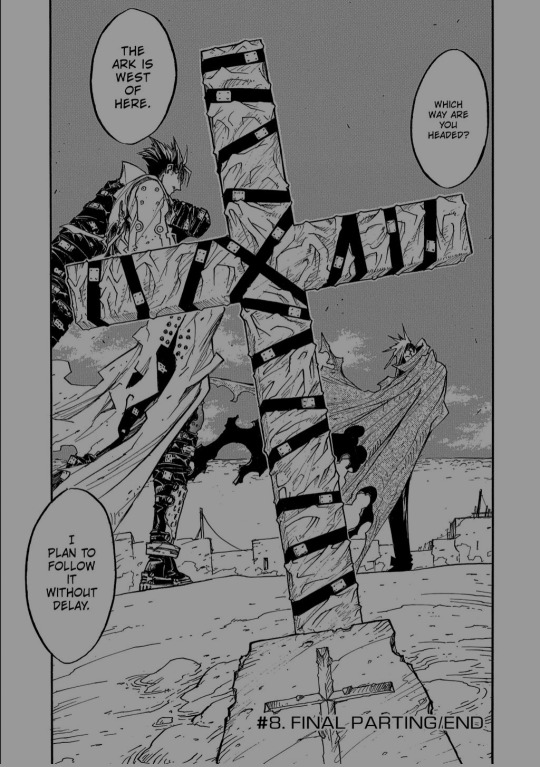
ID: Wolfwood’s grave with the Punisher sitting as a grave-cross above the flat headstone is the foreground of the last page of volume 10, chapter 8. In the background Vash and Livio discuss where Vash will go next.
Hell--our first introduction to Wolfwood is him slumped under the Punisher in the desert, and assumed to be dead by the bus driver. The bus driver even comments that he's a really well-prepared dead guy, referring specifically to the cross of the Punisher, which in the first-ever panel we see Wolfwood, looks like a grave marker for him-- and ultimately ends up being his grave marker. Since the beginning, our introduction to Wolfwood is him as a dead character, and in a way, he remains so as he literally carries his grave marker throughout the story, only waiting until the right moment when he can truly die.
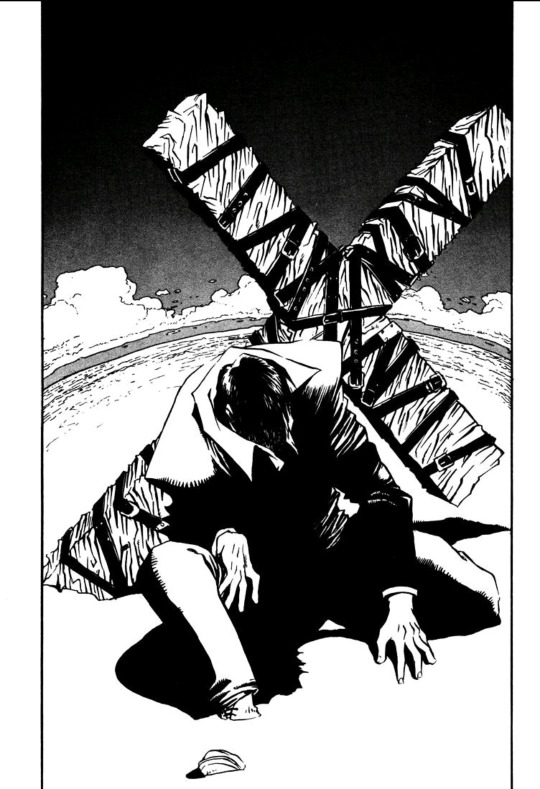
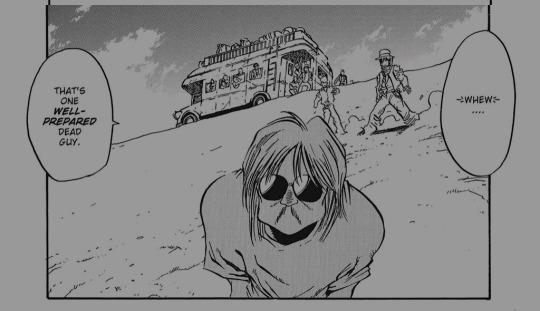
ID: 1. Wolfwood is starkly shaded as he sits unconscious in the desert with the Punisher behind him, almost like a grave marker.
2.. The bus driver comments, “Whew... That’s one well-prepared dead guy.”
As well, not only is the Punisher literally his grave marker and is a symbol of his death, but the other symbolism that it carries can be considered to cause Wolfwood's death; Wolfwood's connection to the EOM, his guilt, and Christian morals. For Wolfwood's connection to the EOM and Chapel, it is Chapel whose actions cause Wolfwood's death. In fact, as Chapel is the one who gave Wolfwood the Punisher, Chapel is the one to give Wolfwood his grave marker--and was the one to ensure that it became his gravemarker. Since the beginning of Chapel taking him under his tutelage, he was condemned to die.
Not only does it symbolize Wolfwood's death as a result of Chapel, but it also symbolizes Wolfwood's guilt over killing as a result of working for EOM, which also contributes to Wolfwood's death. Wolfwood's guilt come into play in his choice to defend the orphanage alone, as he believed that due to his guilt he wasn't worthy or important enough to ask Vash to help him; even if he knows Vash has proved over and over again that he would put aside everything to help anyone. Ultimately, he is proved wrong when Vash shows up anyways, but by this time, it is already too late. Adding to this is Wolfwood's staunch refusal to kill Livio as he declares his belief in Vash--and Vash's principles, ie, Christian principles-- which also causes Wolfwood to die, which Chapel himself notes. As a result, it is his guilt, his connection to Chapel, and to a smaller degree, his acceptance of Christian ethics, that kills him--all things the Punisher, his grave marker, signifies.
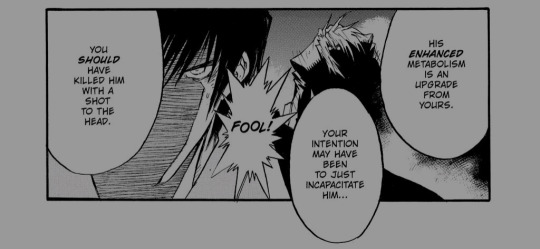
ID: Chapel berating Wolfwood for not shooting to kill Livio.
As well, tying into the historical interpretation of a cross as a torturous execution device, one can take the symbolism of the Punisher, specifically of Wolfwood's profession and deep self-loathing guilt as a result of his ethics he's had to forsake, and interpret the Punisher as metaphorically torturing Wolfwood. And, as it's symbolism is tied to the reasons for his death, one can also metaphorically claim that it is also what causes Wolfwoods own death, or execution; fully fulfilling its historic significance.
Summary
TLDR/To summarize: The Punisher, in its cross shape, ironically symbolizes Christian values which both the punisher itself and Wolfwood contradict, although may aptly symbolize it's historic use of a torturous execution device. Contextually, the Punisher also symbolizes Wolfwood's connection to Chapel and the Eye of Micheal, as well as his guilt over killing people.
The final thing the Punisher represents, is Wolfwood's death, as it literally becomes his grave marker. This is connected to how he is narratively doomed as that he has since the beginning been carrying his grave marker, and even in our first interaction it is foreshadowed to be his gravemarker. The other things the punishers signifies is directly correlated to his death as well, such as Chapel being to one to give Wolfwood his gravemarker, and being the one to cause Wolfwoods death.
All in all, Wolfwood as a character was never, since the very moment we met him, meant to survive the series; he's been literally carrying his grave marker the whole time. There was never any chance of him being able to escape his life the way he so desperately wanted to. He's been dead since the beginning.
.
ANYWAYS Uhm if u enjoyed reading my meta, here's a master post of some other trigun meta I've done :D
Edit (mar 26): At the suggestion of @princess-of-purple-prose and using/adapting the ID's they've added via a reblog on my post, I've added ID's to the photos to allow clarity of reading for those unable/have difficult accessing the photos.
#trigun#trigun manga#trigun maximum#trimax#wolfwood#nicholas d. wolfwood#trigun manga spoilers#trigun spoilers#tragic narratives#trigun meta#trigun analysis#hugin rambles#chapel trigun#livio the double fang#vash the stampede#uhm yeah not actually vashwood for once. but in spirit u know.#god Nightow is fucking insane#when i realized that the punisher was one of his gravemarkers and hed carried it around with him since the beginning#i was frothing at the mouth#just the amount of foreshadowing to wolfwoods death. and because you onow he just desperately doesn't want do this and he yearns#for a softer life outside all of it... and only to die. to since the beginning be doomed to die#another foreshadowing i didn't put in here is the foreshadowing when he tells vash to kill him if it would make vash finally kill#but thats a whole nother can of worms#anyways uhhhhhh hey yall did anyone ask for a larger serving of angst today!#btw if peeps wanna scream about shit w me the dms/ask box is always open#i think its enabled aksjskskk#god to have your character literally carry their gravestone with them the entire time is. fuck#me desperately trying not to be emotionally devastated by everything: *literally crying* yeah this is fine#the promise of tomorrow was a promise that never could be kept you know?#vashwood
362 notes
·
View notes
Text
Hmm, I think that some of my new followers might appreciate this passage I just wrote for my paper:
Ultimately, caring about culture means caring about the bodies which practice that culture. Failing to care about those bodies, letting them become “bare life” means failing to care about culture. Or rather, I should say failing to care about bodies is a failure to care well about culture. Museums have historically served to preserve culture without necessarily maintaining it. A museum is a dead thing, a place where the artifacts of culture put on static display to be silently observed. The only bodies that move in museums do not interact with the artifacts contained within in the same way that the bodies who produced them would. As Shimrit Lee puts in her book Decolonize Museums:
By displaying humans, animals, and objects alike in detailed, simulated environments, curators sought to capture particular cultures and time periods. This act of “viewing culture”—from world’s fairs to the museums of today—results in what Johannes Fabian called a “petrified relation,” whereby various non-European societies are perceived to be living in a different historical epoch. Today, these types of exhibitions continue to deny the possibility of shared humanity and connection between visitors and the people whose cultures are on display. (Lee 2022)
It is bodies in living relation to one another that make and practice culture. In museums, culture becomes disembodied and thereby disconnected the human experience of it. Instead, cultural artifacts become props in a curatorial narrative: “These objects, violently plundered from the colonies, were first “decontextualized,” or extracted from the context of their original use, and then “recontextualized” in the sense that they were inserted into new settings” (Lee 2022).
Like, imagine how insane I felt listening to Winter in Hieron while this is the sort of thing I’m studying, thinking about, and writing. Hieron is literally built on physical and metaphysical recontextualization! And beyond that, even the mortals who are unaware of the metaphysical nature of Hieron’s reality are constantly struggling over how culture should be contextualized. Mother Glory’s death hit me so hard precisely because it was a symbolic victory of Rosemerrow’s recontextualization of culture. In turn, Fero’s decision not to stay and help the gnolls is such a monumental failure to care about (I’m using that in a technical sense, dw about it, iykyk) their culture and their, er, humanity..? Gnollnity? Whatever, that which makes them subjects. And don’t even get me started on the orcs, who have so completely mastered recontextualizing culture that they it enables them to DO MAGIC. Like, pattern magic clearly depends on culture in order to give facets of the material world meaning (libraries, desks, broken mirrors, stolen fiddles, and so forth) but it doesn’t actually have any interest in that context beyond that. Lem is able to do pattern magic without really what the materials he’s using really are beyond their place in the pattern. You know, now that I’m thinking about it, I’m not even sure he knows what the deal with his fiddle even is? I might be wrong, but the point is that the fiddle seems to be more important for its place in the pattern than for the thing it actually is as defined by its history.
Ugh, this show is making me feel rabid and I gotta stop writing this post and get back to the actual paper I’m writing…
#claire thoughts#winter in hieron#jack told me to post my thoughts about the show more#so blame them for this#friends at the table
46 notes
·
View notes
Text
ok i still don’t get why ppl hate toshiro so much… he’s a great foil to both laios and marcille (in different ways), he’s sopping wet and miserable, he saw a weird bug girl and was like “this is my soulmate,” what’s not to like? because he secretly can’t stand laois, who doesn’t even call him by his real name? no offense, i know this is the autism website, but as someone who has been in toshiro’s shoes in those kinds of relationships, there’s absolutely nothing morally wrong about disliking someone who can’t take a hint and nonetheless being polite and courteous to them because you inhabit the same circles. if anything, toshiro is kind of a hero for wanting to marry a girl whose brother he cannot fucking stand, especially considering that she is so close to him and therefore he would have to spend a lot of time with laios as his brother-in-law. he was willing to do that for falin, because he was genuinely in love with her. he probably feels guilty as hell that he left the party to regroup, and in the meantime, falin’s cockblocking brother and the rival for falin’s affections concocted some sort of illegal scheme that would jeopardize everyone involved including falin’s safety. and he’s immediately proven right (at least in his mind), because she has now become the product of dark magic, so of course that’s marcille’s fault somehow, considering all he knows about the situation is that she used black magic to revive falin, and now falin is this. no, i don’t think falin actually feels the same way about him that he does about her, and mickbell is right that it’s weird to propose with absolutely no preamble, but like chilchuck says, it’s normal in his culture, and the normalization of marriage as an expression of romance leads to that kind of behavior from naive idealists, which toshiro is. i don’t think toshiro is knowingly participating in a misogynistic patriarchal tradition out of a desire to trap falin in a situation she feels she has no choice but to accept, i think he genuinely thinks that he’s following his heart and giving falin the choice to follow hers. and i don’t think he’s actively going “ugh this guy is so fucking annoying because he’s autistic and i hate autistic people.” like he clearly is in love with falin, so that’s not what it is…. he’s just unused to knowing someone so forward and unconcerned with reading the room; to toshiro that reads as callousness, even if he does know that laios means well. he’s a product of his culture. social cues and expectations are contextual, and laios is considered socially abnormal even within his own society. toshiro isn’t uniquely evil for being put off by an objectively offputting guy. he isn’t evil at all.
#o.tv#also he doesn’t HATE laois like let’s be real#he finds him annoying at times but at other times admires him#like he’s clearly not doing well and taking it out on laois for obvious reasons#laois is right to be like L + ratio + eat a fucking meal + take a nap + shower#he’s depressed and pathetic…… cut him some slack
26 notes
·
View notes